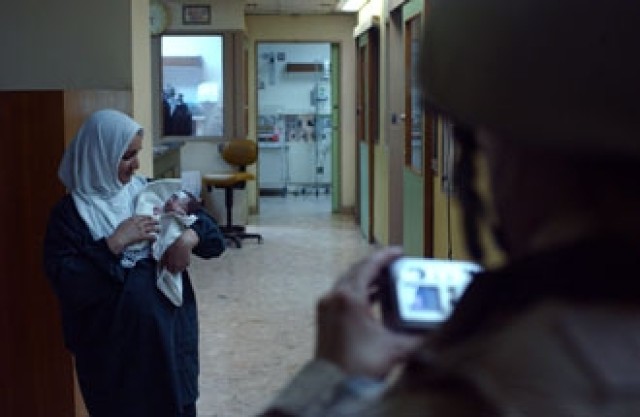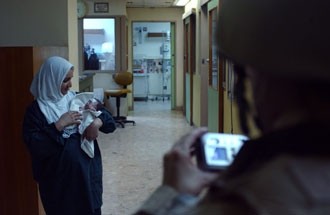Sunday, 19 November 2006
BAGHDAD - The cries of a newborn never sounded so sweet, though a tough journey still lies ahead of the five-week-old infant. The fact the child still breathes is living proof of progress.
The Baghdad Teaching Hospital, also known as the Medical City Teaching Hospital is responsible for the birth of this tiny miracle.
Born prematurely at 26 weeks, the tiny infant is still clinging to life approximately five weeks later, said Lt. Col. Neil Ahle, the senior veterinary medical officer for 1st Cavalry Division, who works on civil affairs projects for the division.
"I think to allow that infant to survive in this environment is a real tribute to the Iraqi medical system," the native of Lawrence, Kan., said. "They have people in there who truly care about these infants and are doing the job they need to do. They kept this baby alive and I think they were celebrating that a little bit while we were there. That was heartening. It was good to see."
Ahle, member of a joint civil affairs team, said their mission was to assess the needs of this functioning, yet challenged hospital, as well as two other hospitals and Baghdad's city morgue. Their findings will pinpoint what is needed to bring the facilities up to standard. He said his team was on the lookout for equipment and structures, which had fallen into an extensive state of disrepair, he said.
Aside from equipment, sanitation is a constant challenge for the hospital. Disposal of waste is a leading challenge in Baghdad.
The accumulation of trash leads to unhealthy living conditions and increases the possibility of an epidemic, said Lt. Col. Chrissy Sanford, public health team chief, 414th Civil Affairs Battalion, 354th Civil Affairs Brigade.
"It's amazing what washing your hands can do to eradicate sickness and disease," Sanford, a Wilmington, N.C., native said.
Though sanitation could improve, Ahle said the major problem at the Baghdad Teaching Hospital is lack of medicine and medical supplies caused by delivery issues.
On top of logistical issues the hospital is struggling to treat victims of sectarian violence, especially victims of Improvised Explosive Devices, Ahle said.
Despite challenges, the hospital still treats patients and trains the doctors of tomorrow, bringing new life and hope into Iraq.
"We're making a lot of progress," Ahle said. "Do we have a long way to go yet' Absolutely!"
However, hope is alive at the Baghdad Teaching Hospital, along with a five-week-old premature Iraqi infant.


Social Sharing